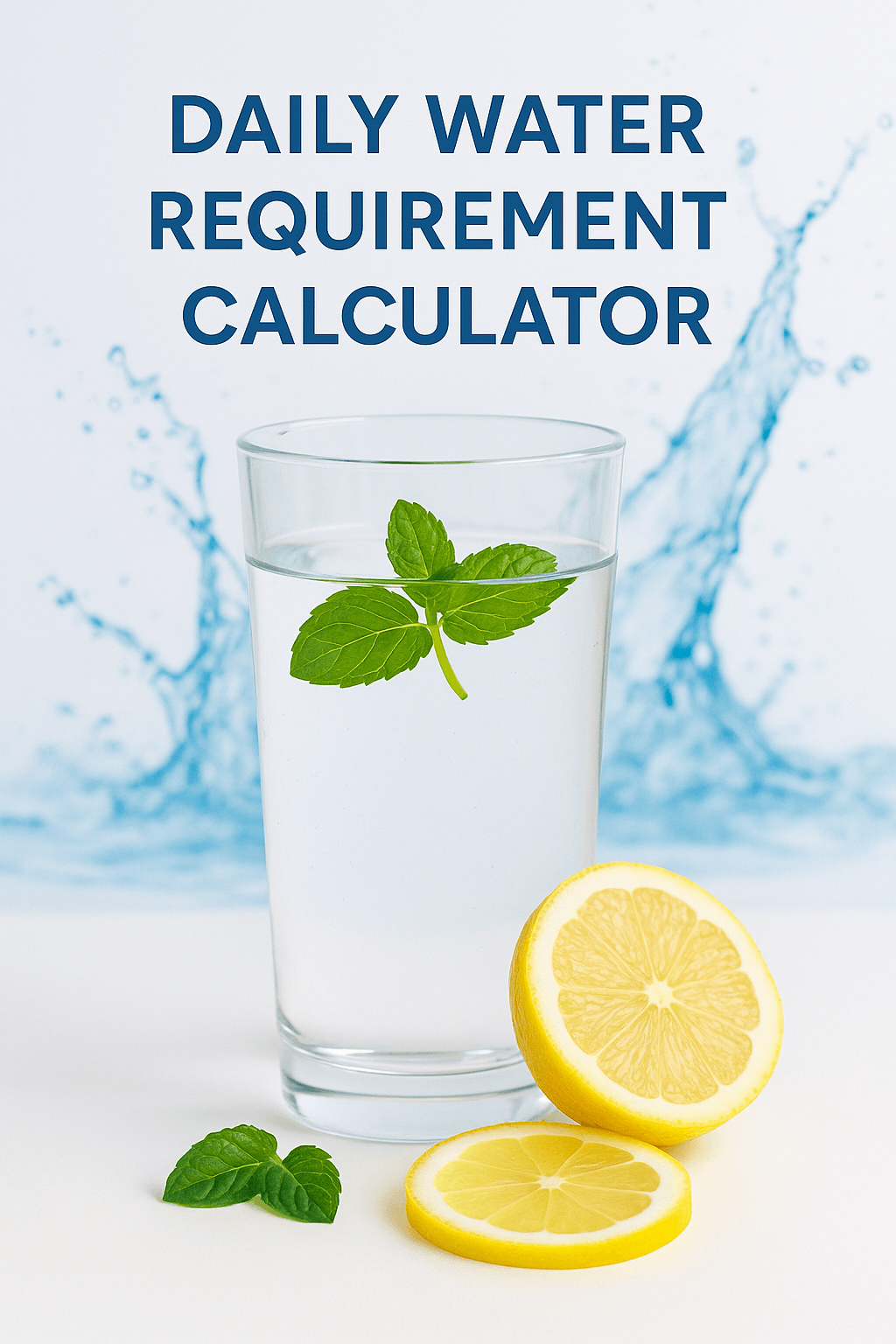Staying hydrated is one of the most important steps you can take for your health. Water makes up about 60% of your body weight and is essential for nearly every bodily function, from regulating temperature to flushing out toxins and aiding digestion.
However, the amount of water each person needs can vary widely depending on several factors including age, weight, climate, and level of physical activity.
Our Daily Water Requirement Calculator helps you find out exactly how much water your body needs to stay healthy and energized every day.
Why is Water Intake Important?

Water is much more than just a way to quench thirst. It plays a critical role in many vital functions:
-
Regulates body temperature through sweating and respiration
-
Helps with digestion by aiding the breakdown of food and the absorption of nutrients
-
Flushes out waste products and toxins through urine and sweat
-
Keeps joints lubricated, helping you move easily and comfortably
-
Maintains healthy skin, giving it elasticity and a youthful glow
-
Boosts brain function by improving concentration, alertness, and memory
Failing to drink enough water can lead to dehydration, which might cause headaches, fatigue, dizziness, dry skin, and even more serious health issues if left unchecked.
Factors That Affect Your Daily Water Requirement
Several factors influence how much water you should be drinking:
1. Body Weight
Your body size has a significant impact on your water needs. Larger bodies require more fluids to maintain proper function compared to smaller ones.
2. Physical Activity
The more active you are, the more water you lose through sweat. Whether you’re running, cycling, playing sports, or even doing heavy physical labor, your daily water needs will increase.
3. Climate and Environment
Living in a hot or humid climate causes more sweating and therefore increases your need for water. Even at higher altitudes, the body loses moisture faster, requiring additional hydration.
4. Diet
What you eat can influence how much water you need. High-protein diets, salty foods, or foods rich in fiber can increase your water requirements. On the other hand, fruits and vegetables with high water content can contribute to your hydration levels.
5. Health Conditions
Certain health conditions, such as fever, diarrhea, vomiting, urinary tract infections, or kidney stones, may require an increase in fluid intake. Pregnant and breastfeeding women also need more water to stay hydrated.
How Our Calculator Works
Our Daily Water Requirement Calculator uses your personal details, such as age, gender, body weight, and physical activity level, to estimate the ideal amount of water you should drink each day.
Simply enter your information, and the calculator will instantly show you a recommended daily intake in liters or ounces, depending on your preference.
It’s a simple, fast, and effective way to understand your body’s hydration needs!
Tips for Staying Hydrated
Even after knowing how much water you need, remembering to drink enough throughout the day can be challenging. Here are a few simple tips to help:
-
Carry a water bottle with you everywhere you go
-
Set reminders on your phone to take a few sips every hour
-
Drink a glass of water before every meal
-
Flavor your water with slices of lemon, cucumber, or mint if you find plain water boring
-
Eat water-rich foods like cucumbers, watermelon, oranges, and strawberries
-
Listen to your body’s signals — thirst is a late indicator, so don’t wait to feel thirsty to drink water
How to Tell If You’re Dehydrated
Dehydration can sometimes sneak up without obvious symptoms. Here are some signs you might need more water:
-
Dark yellow or strong-smelling urine
-
Dry mouth and lips
-
Fatigue and low energy levels
-
Dizziness or lightheadedness
-
Headaches
-
Constipation
If you notice any of these signs, it’s important to increase your water intake immediately.
Common Myths About Drinking Water
There are many myths surrounding water intake. Let’s clear up a few:
Myth 1: You must drink 8 glasses of water a day
While it’s a good general guideline, everyone’s needs are different. Factors like body size, activity level, and environment all influence the right amount for you.
Myth 2: Drinking too much water is always good
It’s possible to drink too much water, a condition known as water intoxication or hyponatremia, which can be dangerous. Balance is key.
Myth 3: Thirst is a good indicator
By the time you feel thirsty, you’re already slightly dehydrated. It’s better to proactively maintain hydration rather than waiting for thirst cues.
Final Thoughts
Hydration is crucial for your physical and mental health. Using a Daily Water Requirement Calculator can help you better understand your unique needs and create habits that support your long-term well-being.
Small steps like drinking water regularly throughout the day, choosing hydrating foods, and paying attention to your body’s signs can make a big difference.
Stay proactive about hydration, and you’ll likely notice improvements in your energy levels, skin, mood, and overall health!
